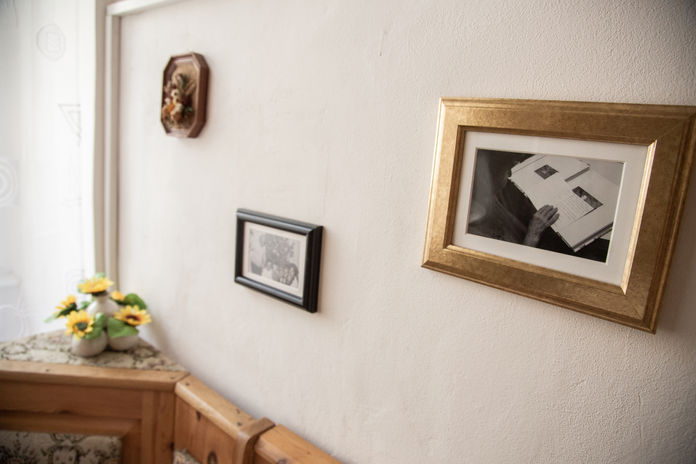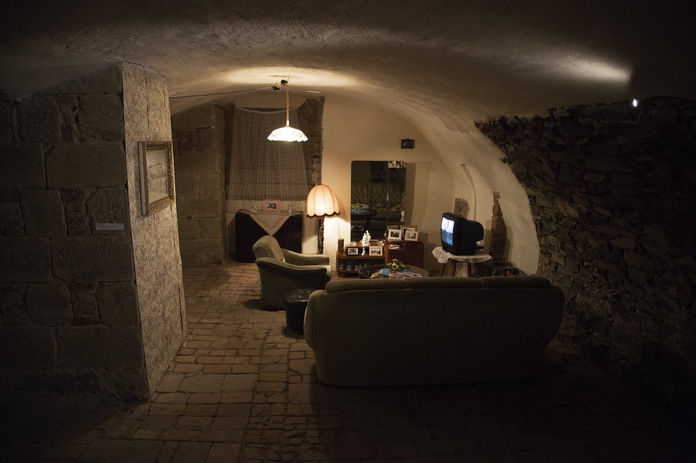LUKÁŠ HOUDEK
ARTWORKS
Výročí / Anniversary (2012)




Před jednadvaceti lety ve sklepě maloměstského činžovního domu donutil tehdy asi šestiletého chlapce jeden z mladíků, aby mu byl po vůli. Po příchodu dítěte domů si matka všimla, že je její syn nějak zamlklý. Vyzvedla ho proto na kuchyňský stůl a on jí po svém sdělil, co se stalo. Ve shonu, ve kterém se právě při obstarávání domácnosti matka zmítala, pravý význam synových slov nepochopila. Mávla jen rukou se slovy, že se mu jen něco zdálo, aniž by si uvědomovala, jakou realitu se snažil svou dětskou mluvou odhalit.
Syn postupně rostl, zatímco zážitek z vlhkého sklepa si nesl s sebou. Nesl si s sebou i myšlenku, že matka situaci, se kterou si nevěděla rady, hodila za hlavu. Že ho podezřívala, že si ji vymyslel. Když si potom syn začal v pubertě uvědomovat svou odlišnou sexuální orientaci, vracela se také čím dál častěji sklepní etuda. Současně v něm rostlo obviňování matky, jemu nejbližší osoby, ze zamlčení a zametení této zásadní situace pod práh. Neuměl jí odpustit a v náznacích jí její selhání dával najevo.
V dospělosti se mu potom podařilo postupným otevíráním se svému okolí se zážitkem z dětství vyrovnávat. Náhodná setkání s pachatelem v ulicích maloměsta, kde vyrostl, už poměrně zvládal. Přesto se při nich často neubránil husí kůži.
Z poklidného, téměř vyrovnaného života ve velkoměstě, ho ale vytrhla zpráva o pachatelově smrti. Ta se později ukázala jako nepravdivá. Vyvolala v něm ale potřebu tuto etapu v sobě nadobro uzavřít a odpustit – jak jemu, tak sobě i své matce.
Od doby fatálního setkání ve špinavém sklepě právě uběhlo jednadvacet let. Syn se proto rozhodl vytvořit dar s blahopřáním, který k tomuto jubileu svému pachateli osobně předá. Tím darem bylo album plné vlastních fotografií z doby, kdy musel na malém městě s touto zkušeností žít, držet ji ukrytou v sobě a snažit se s ní sám vyrovnat. Doufal, že tím dá pachateli najevo, že o setkání ví, a že tím současně tuto kapitolu sám pro sebe uzavře. Aspoň na čas.
Syn si uvědomil, že musí o tomto kroku informovat také svou matku. Nedokázal totiž předvídat, jak může pachatel na své odhalení reagovat. Jednoho dne, kdy se k akci rozhodl, proto oba dva předměty před svou matku postavil s tím, že ona sice nebude s jejich předáním souhlasit, ale syn by byl rád, aby se matka připravila na případné následky. Když se nic netušící matka se zájmem do čtení blahopřání ponořila, po několika vteřinách pohlédla zděšeně do synových očí, zatímco jí po tvářích stékaly slzy: „Cože?!? Proč jsi mi to nikdy neřekl?! Zabila bych ho!“ Takovou reakci syn nečekal. Argumentoval, že o tom přeci matka odjakživa ví, že sama situaci nechtěla nijak řešit a zametla ji pod koberec. Pachatelova matka byla přeci její spolupracovnice. Už jen proto nechtěla, podle synova úsudku, situaci řešit. Navíc v teráriu postkomunistického maloměsta.
Ukázalo se, že matka slova svého šestiletého syna nepochopila. Netušila, čím si prošel a proč se snažil při první příležitosti rodné město mermomocí opustit. Když syn matce své odhodlání předat dar svému pachateli popsal, souhlasila. Chápala to.
Po další společné diskusi ale matka se synem nakonec došli ke společnému rozhodnutí, že dar pachateli nepředají, aby předešli dalším možným lidským tragédiím, které by mohl vyvolat. Svůj účel, přestože nebyl tím prvotním, dar k výročí fatálního setkání splnil. Odstranil bariéru, kterou mezi nimi mnohaleté mlčení postavilo, a syn matce odpustil.
Twenty-one years ago, in the basement of a small-town apartment house, one of lads forced a back-then six-year-old boy to be at his will. After the child had arrived home, his mother noticed, that her son was somewhat silent. So she picked him up onto the kitchen table and he conveyed to her in his on way, what has happened. In the rush of handling the household the mother was dealing with at that moment, the mother did not understand the real meaning of her son’s words. She just waved her hand over it, saying, that he was probably just imagining something, without realizing, what kind of reality he was trying to uncover by his childlike speech.
The son was growing up, while carrying his experience from the wet basement along. He was carrying along even the thought, that his mother had simply thrown the situation, she didn’t know how to deal with, behind her head. When the son started to realize his different sexual orientation during his puberty, this basement etude started coming back to him. At the same time, a feeling of blame for concealing and sweeping this major situation under the carpet, started growing in him. He couldn’t forgive her, and, in his hints, he was showing her failure to her.
In his adulthood, by slowly opening to his surroundings, he managed to start slowly recovering from his childhood experience. He was handling his random encounters with the offender in his hometown quite well, even though he often couldn’t resist getting the goosebumps. Eight years ago, his peaceful, almost balanced life in a city was shaken by news of the offender’s death. The news later showed to be false. However, it brought about a need to close this chapter for good and to forgive, whether to him, or himself and his mother.
The son decided to create a gift with a greeting card, which he would personally hand to the offender on the event’s anniversary. The gift was a photo album, full of his own photos from the time, when he had to live with this experience in the small town, keep it hidden in himself and try to cope with it by himself. He was hoping, that by this, he would let the offender know, that he knew about the meeting and at the same time, that he would close this chapter for himself. At least for a time.
The son realized that he needed to inform his mother about this step as well. He had no idea how the offender would react to his revelation. One day, when he decided to act, he put the two objects in front of her mother with a notion, that his mother wouldn’t with handing them over, but the son would like his mother for eventual consequences. When his unsuspecting mother dove herself in reading the card, after a few seconds, terrified, she looked into her son’s eyes, while tears were flowing down her cheeks: “What?!? Why have you never told me?! I would have killed him!” The son was not expecting such a reaction. He was arguing that his mother had known since ever, that she herself didn’t want to deal with the situation and that she had swept it under the carpet. After all, the offender’s mother was her co-worker. Just for that reason, by her son’s judgement, she didn’t want to deal with the situation. Even more so in the climate of a small communistic town.
It turned out, that the mother didn’t understand the words of his six-years-old son. She had
no idea what he had been through and why he was trying so desperately to leave the town at the first chance. When the son described his determination to hand the gift over to the perpetrator, she agreed. She understood. After further discussion, the mother and son came to a decision not to give the gift to the perpetrator to prevent further human tragedies, that this could induce. The purpose, despite not the main one, was accomplished. The gift removed the barrier, which the years-long silence had build between them, and the son forgave his mother.


















